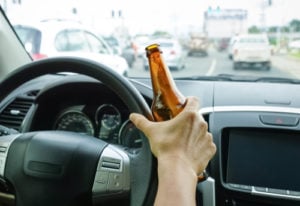
If you or a loved one was arrested for a DWI (driving while intoxicated) in Texas, you might be worried about jail time. While jail time typically isn’t mandatory for a first DWI conviction in Texas, it can be a sentence in this kind of case. However, you could avoid jail time, get your penalties reduced, or even have your case dismissed with a good DWI defense lawyer.
A Houston DWI lawyer from our firm can put your defense together, present it on your behalf in court, and fight for you before a judge and jury. After all, you deserve legal representation and someone who will fight for the best possible outcome for you.
When Could I End Up in Jail for a First-Time DWI?
While jail time is not mandatory for a first DWI in most cases, it could be if certain factors are present:
- You had an open container in the vehicle at the time of your arrest. You face a minimum of six days in jail for an open container violation.
- You had a child under the age of 15 in your vehicle at the time of your arrest. This is a state jail felony, which means you face at least 180 days in state jail.
- You have a BAC of 0.15 or above. You could face up to one year in jail.
- You caused an accident. This is a very serious situation. If you caused an injury accident, you face an intoxication assault charge—a third-degree felony. If you are convicted, you face between 2 and 10 years in prison. If you caused a fatal accident, you face intoxication manslaughter charges—a second-degree felony. Upon conviction, you face between 2 and 20 years in prison. With aggravating circumstances, you could face first-degree felony charges—and up to a lifetime in prison (with a minimum of 5 years behind bars).
For a legal consultation, call 713-225-1900
How Can You Avoid Jail Time for a First DWI in Texas?
Texas judges take DWI cases very seriously—even first-offense DWI cases. Thus, it’s possible for first-time offenders to face jail time, especially in DWI cases involving an accident, high blood alcohol concentration (BAC), or if a person has other criminal history.
However, the length of a jail sentence isn’t set in stone, and, as stated above, jail time isn’t mandatory for a first DWI offense. Thus, your attorney can make a case to have your jail sentence shortened or even eliminated.
For example, your lawyer could get the prosecutor to agree to community supervision (probation) as a plea bargain. On probation, you wouldn’t face jail time so long as you abide by specific rules during your sentence. If you are eligible for deferred adjudication after a DWI, you could avoid jail time and a conviction.
Another option in your case might be to fight the drunk driving charge and push for a reduction or dismissal. For instance, in some counties you could seek a reduction to a reckless driving charge.
Alternatively, if we are able to find problems with the case, we will fight for a dismissal. When the prosecutor files a dismissal, judges regularly dismiss DWI charges in Texas, especially in first-time cases.
Our team will investigate your arrest and your charges and determine the best route to take in your case. You can be sure that our firm is fighting tooth and nail to protect your freedom and future.
How Can an Attorney Help Me Avoid Jail Time for My First DWI in Texas?
You may feel overwhelmed thinking about your case and the prospect of facing jail time. However, you could avoid jail time entirely with the help of a Houston criminal defense lawyer from our firm.
By leaving your case in the hands of a DWI defense attorney from our firm, you can leave these tasks in our hands:
- Investigating your case and gathering evidence, such as video footage from the arresting officer’s vehicle or body camera
- Corroborating your evidence with statements from experts or eyewitnesses
- Challenging the state’s evidence against you and the authorities’ handling of your arrest
- Handling plea bargain negotiations with the prosecuting attorney
- Fighting for a reduction or dismissal of your charges
- Arguing your case at trial to a jury if necessary
- Fighting to keep your license during an Administrative License Revocation (ALR) hearing
About Your DWI Attorney
At our criminal defense firm, our team takes on DWI cases all the time, so your attorney will know precisely how to handle your case. Even if you believe you’ll get jail time in your case, we’re confident our team can help.
You’ll have a specialized criminal defense lawyer on your side who will push hard for the best possible outcome for your case.
Click to contact our Houston lawyer today
What Happens with Your First DWI in Texas?
What happens next depends on how the state chooses to handle your case. It could:
- Charge you with a Class B misdemeanor
- Charge you with a Class A misdemeanor (which can occur if you have a BAC over 0.15)
- Charge you with a state jail felony if you had a minor under 15 in the car
- Charge you with a third- or second-degree felony if you caused an accident with injuries or fatalities
- Dismiss or reduce your charge if it doesn’t believe it has a strong case
If your lawyer can get your charge reduced or dismissed, you could avoid the consequences of a misdemeanor DWI conviction in Texas. This means you could avoid jail time, fines, and more.
With a Houston DWI lawyer from our firm on your team, we could make a strong case for a dismissal or reduction of your charge. We’ll explain how we’ll investigate your case for you during our initial consultation.
Complete a Case Evaluation form now
Is a First DWI a Felony in Texas?
Your first arrest for DWI in Texas might leave you feeling alarmed and worried. That’s understandable, but you probably shouldn’t worry about being charged with a felony. Typically, first DWIs in Texas aren’t charged as felonies. This is even true if you have a high blood alcohol concentration.
It’s more common for first DWI offenses to be charged as misdemeanors, which aren’t nearly as serious as felonies. There are two misdemeanor punishment ranges associated with first DWI offenses.
Class B Misdemeanors
A Class B misdemeanor is the most common kind associated with first-time DWI offenses. If convicted of a Class B misdemeanor, you generally face these penalties:
- A fine of no more than $2,000
- Jail time up to 180 days
Class A Misdemeanors
A Class A misdemeanor isn’t commonly associated with first-time DWIs. You probably won’t face a Class A misdemeanor charge unless you had a blood alcohol concentration (BAC) of 0.15 or greater (almost twice the legal limit) when you were arrested.
A Class A misdemeanor generally has more severe penalties:
- A fine of no more than $4,000
- Up to a year in jail
Your license might also be suspended; the suspension time will depend on the specifics of your case.
Can I Get Probation for a First-Time DWI in Texas?
Yes, if you meet specific eligibility requirements, the judge may choose to assign you probation or deferred adjudication.
If you get probation, there are certain conditions you must abide by. These could include:
- A DWI education course
- Community service
- Avoiding drinking or drug use
- Fines
- Meeting with your probation officer (PO)
- Telling your probation officer and/or the court if your address changes
- Getting your probation officer’s permission to leave the state or country
- Mandatory installation of an ignition interlock device
- Avoiding other people who have committed criminal offenses
- Avoiding committing crimes
- Keeping a job
- Submitting to drug testing
- Submitting to home inspections by your probation officer
- M.A.D.D. Victim Impact Panel
- Drug and alcohol dependence evaluation
If you fail to abide by the terms of your probation, you could end up facing all the penalties associated with a conviction—jail time included.
How Long Will My Probation Last?
How long you’ll remain on probation depends on the specifics of your DWI arrest and case. Probation for a misdemeanor DWI can last up to two years.
What Penalties Can I Face if I Violate Probation?
If you are accused of violating your DWI probation, several things may happen:
- Warning: You may receive a warning instead of your probation officer asking for a warrant for your arrest. This is more common with minor violations.
- Court appearance: You may need to appear before the judge. In some cases, the judge will have you explain yourself and give you a more formal warning.
- Change in probation terms: Depending on the specifics, the terms of your probation may change. They may be stricter, or you may end up on probation for longer.
- Jail or prison time: The judge could sentence you to jail or prison.
Proving Probation Violations
The burden of proof for a probation violation is way lower than for your original conviction. To convict you, a prosecutor must prove your guilt “beyond a reasonable doubt.” This means that if there is any doubt about whether you were driving while under the influence, you should not be found guilty.
However, with a probation violation, the prosecutor only needs to prove it by a “preponderance of the evidence.” This essentially means that it’s more likely than not that you violated your probation.
This is why it’s important to have an attorney from our firm on your side. We have considerable experience handling probation violation defense.
Will a DWI Appear on My Criminal Record?
Yes, a DWI conviction will appear and remain on your criminal record. A DWI charge will also show up on a background check. You may be able to get it expunged or sealed.
Does a Successful Probation Completion Remove the DWI from My Record?
No, a DWI will remain on your record even after you complete your probation. This is because, even though you completed your probation, you were still convicted of a crime. You may be able to get your record expunged or sealed through a non-disclosure order.
Our team can help you determine whether you are eligible for non-disclosure or expungement. If so, we’ll handle the entire process on your behalf.
How does Texas Define a DWI?
A person can be charged with DWI if they are driving a vehicle in a public place while intoxicated. Per Texas law, a person is intoxicated if:
- They do not have “normal use” of their mental or physical faculties due to alcohol, controlled substances, or both; OR
- They have a blood alcohol concentration of 0.08 or more.
This means that you can be charged with DWI, even if you don’t have a BAC of 0.08 or above.
Our team has many years of experience defending clients against DWI charges. We know how to poke holes in the case against you, establishing that you were not intoxicated while behind the wheel.
Jail Time doesn’t Have to be Mandatory for a First DWI in Texas
You shouldn’t resign yourself to the idea of jail time in your or your loved one’s drunk driving case. Jail time isn’t mandatory for a first-time DWI, and there are many ways to avoid or reduce it significantly. We’ll explore these options with you during a consultation and case review with a member of the Blass Law team.
There are plenty of reasons to remain optimistic about your case. Contact Blass Law today to learn more about these reasons during a confidential, no-obligation consultation.
Call or text 713-225-1900 or complete a Case Evaluation form





